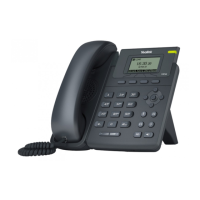type of dtmf.
Note: We recommend that you always define this field. If
it is not defined, the supplied digits are dialed using
INVITE.
The embedded macro. The <macro> string must begin
with a letter. If the macro name is not defined, the
execution of the action string will be ignored.
Example: $MAA$ means invoking the EDK macro AA.
The functionality of performing this action is the same as
that of pressing the desired soft key.
Each soft key has a unique identifier on the IP phone, you
can configure this parameter according to the
system-defined softkey ID. If the softkey ID is not defined
on the phone or there is no matched soft key on the
current screen, the execution of the action string will be
ignored. The softkey ID is case-insensitive.
Example: $Sanswer$ means pressing the Answer soft key.
Yealink IP phones support customizing soft keys. When
invoking a custom soft key, the prefix “#” must be added.
Example: If the custom softkey label is IVR1, the custom
softkey id is custom_macro, then
$S#custom_macro$ means pressing the IVR1 soft key.
Note: To view the softkey ID, you can configure the value
of the parameter “edk.id_mode.enable” to 1 (Enabled) and
then long press the Volume Up key when the phone is
idle.
The functionality of performing this action is the same as
that of pressing the desired hard key.
Supported key names include:
LineKeyX (for SIP-T48G/S, X=1-29; for
SIP-T46G/T46S/T29G, X=1-27; for
SIP-T42G/T42S/T41P/T41S, X=1-15; for SIP-T27P/G,
X=1-21; for SIP-T40P/T40G/T23P/T23G, X=1-3; for
SIP-T21(P) E2, X=1-2).
SoftKeyX (X ranges from 1 to 4)
ArrowUp
ArrowDown
ArrowLeft
ArrowRight

